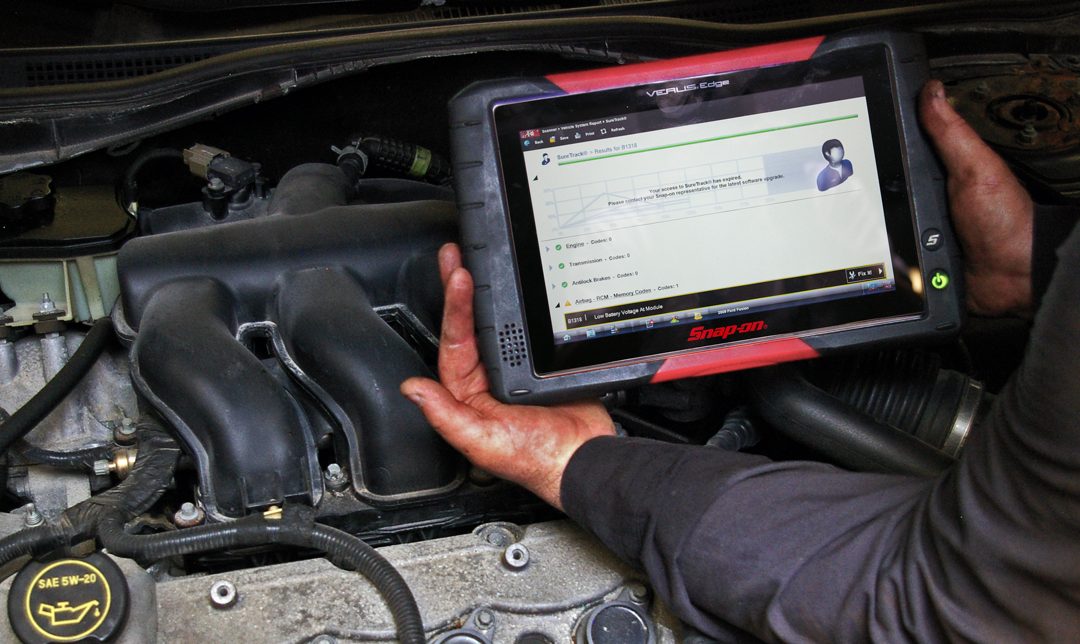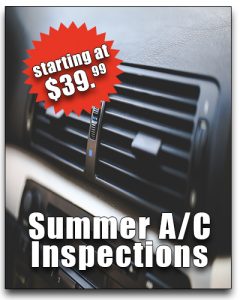The days are getting longer and warmer, the ground is coming back to life and we seem to defrost along with nature, spending more time outside. That usually includes more “auto-time” in your car; either on road trips or on more trips to the Garden Section of your favourite local store.
Your vehicle will have survived the winter well if you performed the necessary maintenance for the cold, icy weather. However, because it is warming up it doesn’t mean your vehicle need less auto maintenance. In fact, spring is the best time to inspect your vehicle to ensure it has survived the winter with minimal issues, and then prepare it for the hot weather coming.
Things you can do
Inspect your Tires
As the temperature increases, so does tire pressure. Cold air takes up less space than warm air. So you will want to monitor your tire pressure as it warms up, so that you can deflate excess pressure (or add air if necessary) to avoid damaging the tire. Inspect the tire tread, sidewalls and rims for any damage that needs addressing
If you have a set of summer and winter tires, you will want to arrange to have them changed out once the temperature is consistently above 5-10° Celcius. Winter tires are made of softer compounds and wear much quicker in warmer conditions.
Spring is also a great time to rotate your tires to promote even wear.
Inspect Windshield Wipers and Change Wiper Fluid
Salt and cold weather can degrade the rubber of your vehicles windshield wipers quicker than usual. Winter wipers are made of different compounds and can have extra covering on the flex points. Great for cold weather, but not for warm weather. Now is a good time to change back to warm weather wiper blades and change back to summer wiper fluid.
Wiper blades that streak, squeek, jump or miss areas of the windshield need to be replaced. Effective wiper blades are an essential part of your vehicles safety systems that should not be overlooked.
Tune-Ups
For those mechanically advanced, spring is the perfect time to perform the following:
- Quarterly oil change
- Inspect spark plugs / spark plug cables (change if necessary)
- Inspect air filter (change if necessary)
- Check and top up fluid levels
- Steering fluid
- Brake fluid
- Transmission fluid
- Antifreeze
- Battery (if not sealed)
Things you probably can’t do
Perhaps you are not a hobbyist mechanic, or do not have the tools and facilities to perform your own maintenance. Then, even the auto inspections listed above may not be in your realm of possible. But there are many other spring tune-up jobs that require specialized equipment we have, but you most likely do not.
Cooling Systems
Draining your radiator stills leaves sludge in the bottom, a coolant flush removes unwanted residue making your cooling system work more efficiently and slows down degredation of the components.
Pressure testing and charging your AC system before summer means you will not find out it’s not working in July. Winter salt can corrode AC lines causing leaks in the system, which results in low or no pressure. No pressure, no AC!
Charging Systems
Your battery has successfully made it through winter, but how much cranking power it may have lost will not be known until a full diagnostic is performed.
Steering and Suspension
Winter roads and potholes can damage tires, rims or your auto’s steering system. If your tires become out of alignment, you will have excess tire wear and possibly a pulling to one side as you drive. Boots, ball joints and other steering and suspension system parts need inspection (and replacement as necessary) after harsh winter driving conditions.
Tune-Ups
Some vehicles nowadays are more difficult to service under the hood than others. Specialized tools or machines may be needed to access parts and components. Have no fear, we have the tools and expertise to fix just about everything.
Check out our Tune-Up packages and book your Spring Maintenance Service today. Call DC Autocare at(519) 736-5757 for more details.



